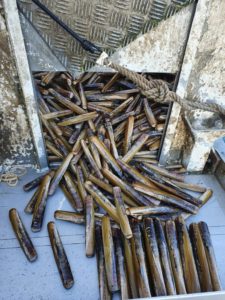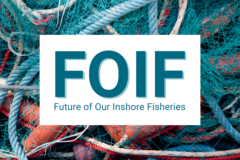Seafish fleet researcher Udara Nagodavithana (pictured above) reports from Pittenweem in Fife on a trial seeking to understand the impacts of electrofishing for razor clams
While I was speaking to skippers and vessel owners in Fife for the annual survey of the UK fishing fleet, I heard about a Scottish government-funded trial on electrofishing for razor clams that began in 2018.

Razor clams supply a lucrative export market – but there are concerns that electrofishing will pose a threat to stock sustainability.
This method of electrofishing is a selective fishing process that specifically targets razor clams. The fishermen involved in the trial are professionally trained scuba divers, and they use an electrofishing technique with probes sending electric pulses. This causes razor clams to emerge from the seabed, and they are then collected by the divers.
Razor clams can live in depths down to 20m. They prefer fine sand but can also be found in muddy sediment. There are six species of this type of bivalve mollusc. The two species of commercial importance are Ensis siliqua and Ensis arcuatus. Unlike the environmental impacts which can be seen with dredging to harvest razor clams, the electrofishing gear has been shown to have minimal impacts on the physical environment.
However, it is a controversial fishing method and there have been concerns raised about the harvesting rate, the efficiency of this fishing method, and the sustainability of razor clam harvest in the future. There are also some extra safety considerations to factor in with this type of fishing, due to the dangers of mixing water and electricity.
The view amongst the fishermen I spoke to was that the trial lacked the resources to carry out impact assessments that surveyed the wider areas in which razor clams burrowed. They believe that a wider assessment on the stock size and distribution is needed to be able to correctly determine a minimum landing size. Overseas markets for razor clams can offer a lucrative income, and the
local fishermen felt that if the grounds weren’t as restricted, this could be a more sustainable industry, supporting future generations of fishers.
Udara is a fleet researcher with Seafish, working on the 2022 Fleet Survey. This is taking place now, with researchers visiting ports and harbours across the country.
If you are happy to take part, please email: fleet.survey@seafish.co.uk with your name, email and/or phone number and port of operation, or visit the Fleet Survey page on the Seafish website to find out when researchers will be in your area.
This story was taken from the latest issue of Fishing News. For more up-to-date and in-depth reports on the UK and Irish commercial fishing sector, subscribe to Fishing News here or buy the latest single issue for just £3.30 here.






